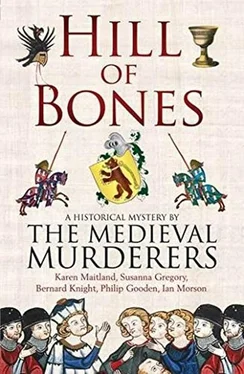Inside, there were two shelves, the lower one carrying vials of oil and unguents, as well as the service books, sheets of parchment bound between wooden covers. Nothing there was amiss, but the upper shelf was almost bare. A couple of silver patens remained, on which the consecrated host was carried to those taking communion, but the pride of the abbey, the golden chalice and the pyx, had gone!
Sweat began to pour from Eldred’s brow. He knew he would get the blame for this, as he was the only one with access to the aumbry, apart from Hubert, the sacrist, responsible for setting up the arrangements for each Mass, who was his direct superior, and Brother Gilbert, the cellarer, who was responsible for the material contents of the abbey. Even Prior Robert did not possess a key. That the aumbry had been forcibly broken into would not help Eldred, unless the real culprit was rapidly discovered, as the prior disliked him and would be only too ready to make him the scapegoat.
As the first horror of the situation subsided into a deadening acceptance, the lay brother knew that he had to report the theft immediately. The chalice, though small, was solid gold, a legacy of the first monastery on this site, many hundreds of years earlier. Eldred was not an educated man – he could neither read nor write – but had been around the abbey for many years and had picked up something of its history from listening to others. The chalice, given by Offa, King of Mercia in the eighth century, was probably made from gold stolen from the Welsh by the Saxons. The pyx, a small gold-lined silver box, was for holding the ‘reserved sacrament’, communion wafers that had been consecrated ready for use.
With feet of lead, Eldred made his way to the steps that led to the south transept, after first pushing the rivets back into the shattered holes in the door of the aumbry. For a moment, he contemplated leaving it as he had found it and letting someone else discover the catastrophe, denying any knowledge of it. But that would be futile, he recognised. Everyone knew that Eldred spent much of his time in the chancel, cleaning and polishing.
He began to hurry and reached the small door set just beyond the south transept, which led directly out into the cloisters. The clergy were thronging the cloister, gossiping as they came out of the refectory into the pillared arcade.
Almost immediately, Eldred saw the skinny figure of the sacrist approaching. Hubert of Frome, the monk responsible for the fabric and furnishings of the abbey, was a small, weasely fellow with a sallow complexion and a turn in his left eye. The black Benedictine habit hung badly on his meagre frame and his permanently irritable expression made him even more unattractive. His first words set the tone for a fraught encounter.
‘Eldred, what are you doing here?’ he rasped. ‘Why have you left your duties?’
There were a dozen monks within hearing distance and Eldred sidled up to the sacrist to murmur in his ear, ‘You must come to the presbytery at once, brother! An evil thing has happened!’
Hubert scowled at his lowly assistant, but something in Eldred’s voice persuaded him not to make a public issue of it in the cloister. He followed Eldred as he scurried back to the presbytery and crossed to the other side without acknowledging the high altar. Hubert crossed himself as he bent a knee, then prepared to berate the other man for not doing the same. But his protests died in his throat as Eldred reached the aumbry and with a dramatic gesture, pulled open the doors to display the broken lock and the bare shelf.
‘The chalice and the pyx, Master! Gone!’
The sacrist was speechless. Then with a moan, he dropped to his knees and peered inside the aumbry. His hand groped blindly at the back of the upper shelf, as if his sense of touch might reassure him that his sight was defective. When he rose to his feet, his normally pallid features were almost dead white with shock.
‘How can this be? What have you done, fellow?’
‘Nothing, Master! I found it like this, not ten minutes ago,’ wailed Eldred. ‘See, the staple has been torn from the wood!’
With trembling fingers, Hubert rattled the still-closed padlock and prodded the long rivets hanging loosely from the staple.
‘You swear by Almighty God that you had no hand in this?’ he hissed. He would liked to have yelled at the top of his voice, but the sanctity of this place overcame even the horror of the situation.
‘Of course, Master!’ said the terrified but still outraged Eldred. ‘I carry a key – why should I break the doors?’
Hubert of Frome managed to pull himself together and his pallor began to change to a rising flush as anger and fear of retribution flooded his system.
‘Prior Robert must be told at once! The chalice was priceless, as well as being a historic legacy. And the pyx…!’ A sudden thought occurred to him and his face blanched once again. ‘Holy Mary! Was there Blessed Host within it?’
Eldred shook his head emphatically. ‘None was reserved after the last Mass – it was all used.’
Hubert puffed out a long breath of relief. ‘Thank God for that!’ he sighed, crossing himself fervently. If consecrated wafers had been stolen along with the sacred vessels, not only would it have been a greater sacrilege, but the pillaged Host would have had a high monetary value. Witches and necromancers set great store by such rare material for their evil rituals and spells.
With sudden resolve, the sacrist grabbed the loose sleeve of Eldred’s robe and pulled him towards the doorway into the side passage.
‘Come with me, we must find the prior immediately!’ he brayed, releasing Eldred’s arm and padding ahead of him back to the cloister door. The unhappy lay brother followed him, his feet slapping on the flagstones as they went into the cloister. The sacrist grabbed the ring of a nearby door, which led into the stores.
‘I saw the prior go in here after dinner. He was seeking Brother Gilbert,’ he said in a voice trembling with agitation, as he pushed the stout door open. Inside it was gloomy, the only light coming from small apertures high up on the walls, laced with wicker mesh to prevent birds from entering to steal the grain that was stored in large tubs. Partitions divided the long chamber into sections, but left a central aisle running its full length.
‘He will be down at the end, in Brother Gilbert’s cell,’ muttered Hubert, pattering down the aisle, past cubicles piled with flour, oats, wheat and fresh vegetables, others containing bales of coarse cloth, kegs of French wine, furniture, candles and all the provisions necessary to sustain a monastic house.
At the end was an arch, beyond which was a chamber stretching across the width of the building, with double doors on the right leading into the abbey yard. A large table was set in the centre, and to the left was a desk where another monk was perched on a high stool. He was busily writing lists of merchandise with a quill on sheets of parchment, held flat with small pebbles from the nearby River Avon.
The sacrist marched up to the table, where two more monks were hunched over a large pile of silver pennies, counting them into leather bags. One was the cellarer, Brother Gilbert, a squat, heavily built man, with black hair shaved high on the back of his neck and temples in the Norman style, leaving a dense rim below his tonsure. The other was Prior Robert, the dictatorial head of the abbey. Though an abbey should have been led by an abbot, the monastery had reverted to a priory a century before, when John of Tours, King William Rufus’ physician, moved the bishopric of Somerset from Wells to Bath and built a great new cathedral on the site.
The present prior was a corpulent man with wiry dark hair. His chubby face carried an almost permanent benign smile, but the responsibilities of his office had eroded his patience so that if he was crossed, this could vanish, to be replaced by a show of temper. At the sound of someone approaching, his bag of money dropped with a clunk onto the table, as he turned his head to beam at his sacrist, whose job he had held himself before his elevation to prior.
Читать дальше












